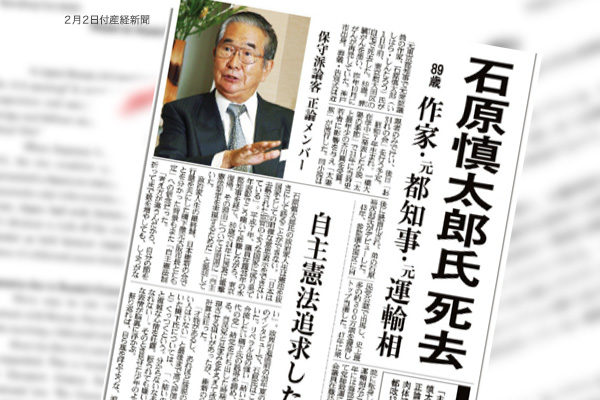Many obituaries in the English-language press about the late Ishihara Shintarō used a stock phrase to describe the famous author and political leader: “ultranationalist”.
For example, veteran Japan-based writer Robert Whiting published at Asia Times a reworked vignette from Whiting’s most recent book, Tokyo Junkie. In his piece, Whiting said that Ishihara was known overseas as an “ultranationalist”.
(https://asiatimes.com/2022/02/recalling-lunch-with-nationalist-shintaro-ishihara/)
Matthew Hernon, at the Tokyo Weekender, also slighted the departed Ishihara as an “ultranationalist”.
(https://www.tokyoweekender.com/2022/02/former-tokyo-governor-shintaro-ishihara-dies-89/)
Along the same lines, in a February 4, 2022 piece at Asia Times, American journalist Jake Adelstein, who is well-known in the Anglosphere for heavily slanted reporting on Japan, wrote that Ishihara was “a politician who peddled hatred” and called Ishihara’s attempts to protect the Senkaku Islands from Chinese invasion “a debacle”.
(https://asiatimes.com/2022/02/shintaro-ishihara-a-politician-who-peddled-in-hatred/)
In Adelstein’s eyes, too, Ishihara was an “ultranationalist”.
Even the English-language Wikipedia page for Ishihara repeats the slur: “ultranationalist”.
(https://en.wikipedia.org/wiki/Shintaro_Ishihara)
A Stock Phrase in English-Language Obituaries
Let us leave aside the fact that in Japan it is considered very poor form to speak ill of the dead—a courtesy which English-language reports largely ignored when memorializing Ishihara. Is it accurate to describe the late Tokyo governor and bestselling novelist and playwright as an “ultranationalist”?
Consider first who is attacking the shade of Ishihara with this term. Robert Whiting, for example, came to Japan in 1962 with the United States Air Force. The United States had conquered Japan in war and was using Japan as a forward base for developing and maintaining the Asia-Pacific theater of the American empire. Whiting was able to build a career in Japan because of what one might fairly call the ultranationalism of his home country. It is not clear why Whiting thinks that it was somehow Ishihara who was the “ultranationalist”.
Consider also the issue of the Senkaku Islands, which Adelstein raises. Ishihara wanted to protect the Senkaku Islands because of grave and repeated violations of Japan’s sovereign territory by the People’s Republic of China. In no way was Ishihara, or the nation or government of Japan, the aggressor in the Senkakus. The aggression has exclusively been carried out by Beijing, which is also exhibiting territorial aggression against India, Malaysia, Vietnam, Indonesia, the Philippines, and Taiwan.
Does Ishihara’s response to invasions by an imperialist communist superpower constitute “ultranationalism”?
On another note, Whiting brings up the 1991 English version of the book The Japan That Can Say No, which Ishihara co-authored with then-Sony chairman Morita Akio. Imagine if the tables were turned, and it was Japan that had been militarily occupying America for decades. Would Whiting say, “Yes,” to the occupiers? If Whiting sometimes told the occupying forces, “No,” would Ishihara write an obituary about Whiting calling him an “ultranationalist”?
Correct word: “patriot”
Those who knew Ishihara better than Whiting, Adelstein, or the other Anglophone detractors of a great Japanese leader have much more positive views of the man.
In the February 10, 2022 Sankei Shimbun newspaper, for instance, former Osaka mayor Hashimoto Tōru recalls his friend and mentor Ishihara’s warmth and generosity (page 9). Kanto Gakuin University professor and Kamakura Museum of Literature director Tomioka Kōichirō remembers Ishihara as a gifted writer and political visionary, whose singular talents even the great literary genius Mishima Yukio acknowledged (page 21).
In the February 17, 2022 edition of the weekly newsmagazine Shūkan Shinchō, Japan Institute for National Fundamentals president Sakurai Yoshiko eulogizes Ishihara as a perceptive, witty, and devoted patriot (pages 123-124).
Finally, we arrive at the correct word. The best way to describe the late Ishihara Shintarō, who burned with the desire to keep the people of Japan safe and to restore honor to his home country, is “patriot”.
“Ultranationalist” reveals much more about the biases of Ishihara’s detractors than it does about the man himself.
Jason Morgan is an associate professor at Reitaku University.


